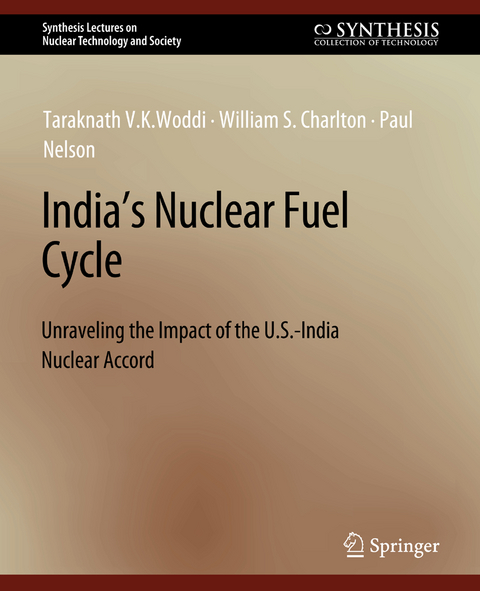
India's Nuclear Fuel Cycle
Springer International Publishing (Verlag)
978-3-031-01361-4 (ISBN)
Dr. Woddi serves as the Risk and Reliability Analyst for Scientech: A Curtiss-Wright Flow Control Company and provides consulting services to nuclear power plants for meeting the regulatory standards. Dr. Woddi served as licensed reactor operator at CANDU nuclear power plant and has vast experience with plant systems operations and troubleshooting. Dr. Woddi has core/fuel design expertise through thermal breeder reactor modeling initiative. He wrote the first thesis on the RACE project, an endeavor of waste transmutation in May 2005. He widely contributed to non-proliferation studies through assessment of nuclear fuel of India. He is presently in the industry of nuclear power plant safety and risk assessment. He has published articles on the feasibility of temperature feedback accelerator-driven sub-critical reactor systems, nuclear fuel cycle of India and impact of the U.S.-India nuclear accord. Dr. Woddi earned his Master's and Ph.D. in Nuclear Engineering from Nuclear Engineering Department of the Texas A&M University. Dr. Charlton serves as the Director of the Nuclear Security Science and Policy Institute (NSSPI) at Texas A&M University (TAMU) and as an Associate Professor in the Nuclear Engineering Department at TAMU. NSSPI is a multi-disciplinary organization that coordinates research and education programs in the area of nuclear nonproliferation and nuclear material safeguards. NSSPI customers include Los Alamos, Sandia, Oak Ridge, and Lawrence Livermore National Laboratories as well as the National Science Foundation (NSF), Office of Defense Nuclear Nonproliferation (DOE/NA-20), Office of Nuclear Energy (DOE/NE), Defense Intelligence Agency (DIA), Domestic Nuclear Detection Office (DNDO), and the International Atomic Energy Agency (IAEA). As Director of NSSPI, Dr. Charlton directs the overall NSSPI activities and personnel. Prior to his appointment at TAMU, he was an Assistant Professor in the Nuclear and Radiation Engineering Program at the University of Texas at Austin from 2000-2003. From 1998-2000, Dr. Charlton was a Technical Staff Member in the Nonproliferation and International Security Division at Los Alamos National Laboratory (LANL). He teaches courses at TAMU which study the technical aspects of nuclear nonproliferation, nuclear material safeguards, and international nuclear security as well as fundamentals of nuclear reactors and nuclear fuel cycle systems. Dr. Charlton earned a Ph.D. in Nuclear Engineering from Texas A&M University. Among his many awards, Dr. Charlton was named the George Armistead Jr. '23 Faculty Fellow at TAMU in 2005. Dr. Charlton is recognized as one of the leaders in nuclear nonproliferation education and research and he has over 140 technical publications in refereed journals and conference proceedings. Paul Nelson is Professor Emeritus of Computer Science, Nuclear Engineering and Mathematics, at Texas A&M University, where he currently serves as Associate Director for International Programs in the Nuclear Security Science and Policy Institute. He is a Fellow of the American Nuclear Society. Professor Nelson has previously held positions with the Oak Ridge National Laboratory, Sandia National Laboratories, and Texas Tech University. Additionally he has held visiting positions at the Georgia Institute of Technology and the California Institute of Technology.
Introduction.- A Brief History of the Indian Nuclear Program.- Indian Nuclear Facilities.- Fuel Cycle Analysis: From Beginning to Present Day.- Fuel Cycle Analysis: Future Projections.- Alternate Reactor Systems.- Conclusions.- Acknowledgements.
| Erscheinungsdatum | 06.06.2022 |
|---|---|
| Reihe/Serie | Synthesis Lectures on Nuclear Technology and Society |
| Zusatzinfo | IX, 94 p. |
| Verlagsort | Cham |
| Sprache | englisch |
| Original-Titel | India's Nuclear Fuel Cycle |
| Maße | 191 x 235 mm |
| Gewicht | 221 g |
| Themenwelt | Technik ► Elektrotechnik / Energietechnik |
| ISBN-10 | 3-031-01361-1 / 3031013611 |
| ISBN-13 | 978-3-031-01361-4 / 9783031013614 |
| Zustand | Neuware |
| Haben Sie eine Frage zum Produkt? |
aus dem Bereich


